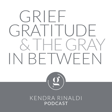
160. Unveiling the Grief-Gut Connection with Stephanie Papadakis
Stephanie Papadakis is a grief recovery specialist, holistic nutrition consultant, and autoimmune protocol coach. After experiencing her own grief, trauma, and health issues, she dedicated herself to helping others heal their broken hearts and address health issues caused by emotional stress - like poor digestive health, hormonal imbalances, and autoimmune diseases.
Through her work, Stephanie helps people deal with grief and trauma in order to heal the gut. She believes that when we honor our grief and give ourselves permission to feel all of our emotions, we can begin to restore balance in our lives and find true happiness.
In her free time, Stephanie loves to travel, eat, explore new places, and meet new people. She is always looking for her next great adventure with her wife and her dog, Bounce.
Web Links
· https://www.gutofintegrity.com/
· IG + TikTok: @gutofintegrity
· https://www.facebook.com/gutofintegrity/
·https://www.facebook.com/groups/thespacebetweengratitudeandgrief
Contact Kendra Rinaldi to be a guest on the show or for Grief Coaching:
https://www.griefgratitudeandthegrayinbetween.com
In this episode we talk about the following topics:
- Stephanie's personal journey through grief and how it impacted her gut health.
- The profound connection between emotional stress, grief, and physical well-being
- Stephanie's transformative experience with nutrition, exercise, and intentional lifestyle changes.
- The importance of addressing emotional and mental health alongside physical health


